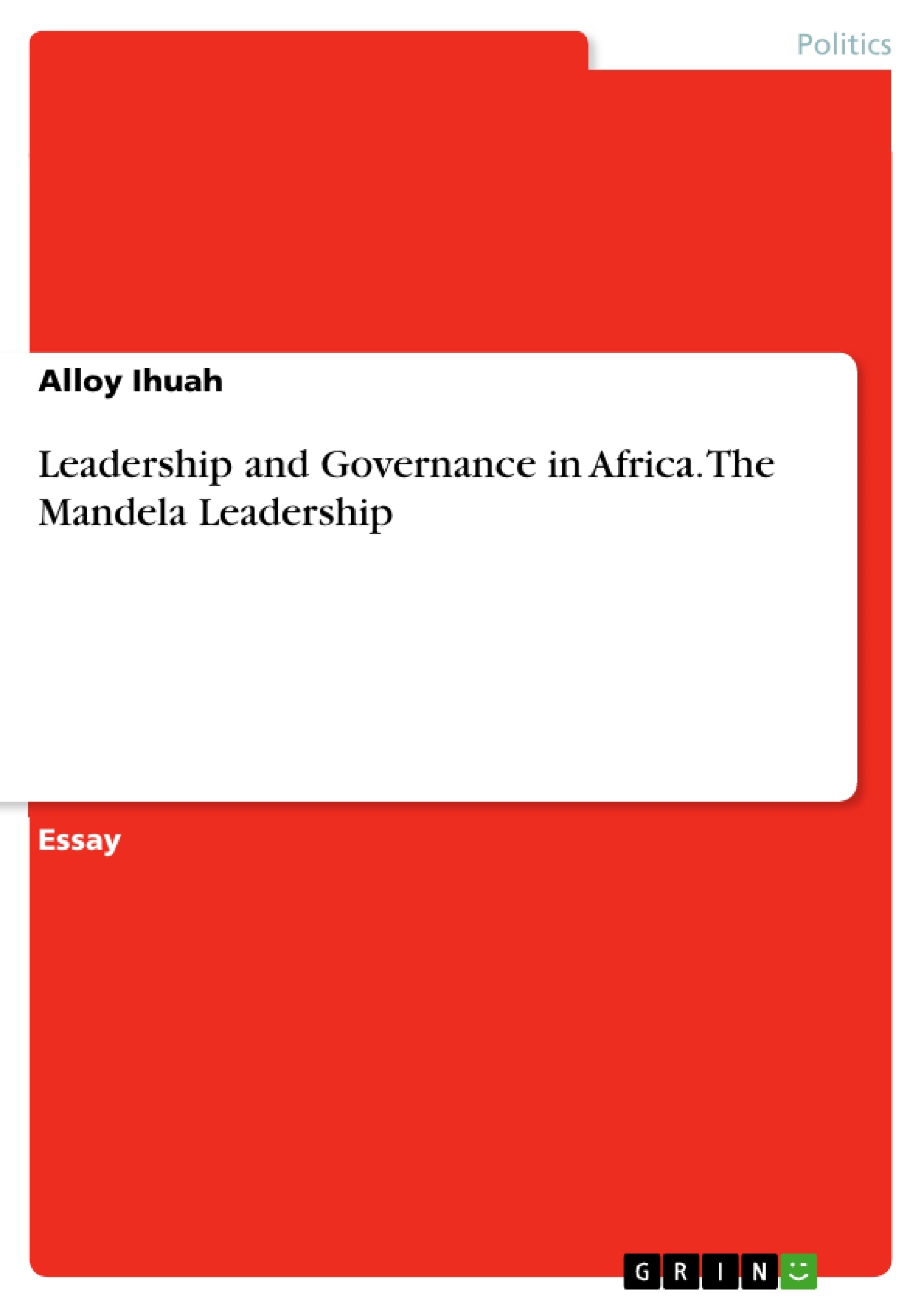This assignment is supposed to provide a portrait of Mandelas leadership and to break down leadership lessons for Africa. Good leadership and governance are key to sustainable human institutions. In Africa, Nelson Mandela stood out as an African icon and an international leader amidst the challenges of the south African environment. The disconnection between the rulers and the ruled suggests that African nations can develop only when the leadership question is rightly settled.
Using the African democratic average, Bewaji draws the examples from Tanzania and Libya, and South Africa may be added to make a point. While acknowledging the giant strides of these and a few other African countries, the recent profound changes in North Africa and the fragmented political space in Libya and Egypt in particular, it is not far from the truth to say that Africa countries are surely governed less by a people oriented philosophy of development.
In many African states, the democratic culture of inclusive participation, constitutionalism, the rule of law, human rights and accountability; the trampoline of democratic consolidation quickly became cumbersome with tyranny of the minority becoming the order of the day. The argued thesis here is that, sustainable democracy is a factor of how well the leadership transits from knowledge to wisdom. Tolerance, widespread participation, political consensus are necessary conditions for democratic consolidation though, they do not in themselves consolidate a democracy if and when there is no responsible and quality leadership which itself results from self-knowledge. The logic of development can only be expressed through the creative application of wisdom that is anchored on the aims of governance.
Inhaltsverzeichnis (Table of Contents)
- The Mandela Leadership Portrait
- Mental Magnitude
- Spiritual Depth
- Self-Knowledge
- Incorruptibility and Selflessness
- Leadership Lessons for Africa
- Madibaism and the power of Inclusive Leadership
Zielsetzung und Themenschwerpunkte (Objectives and Key Themes)
This paper examines the leadership qualities of Nelson Mandela and their relevance for African governance. Drawing on his life and experiences, the author argues that sustainable democracy in Africa requires a shift towards a leadership philosophy rooted in wisdom, integrity, and inclusivity. Mandela's example serves as a model for leaders to emulate, emphasizing the importance of self-knowledge, spiritual depth, and a commitment to serving the people.
- The significance of indigenous African leadership qualities in achieving sustainable democracy
- The importance of self-knowledge, wisdom, and inclusivity in effective leadership
- The role of traditional leadership models in shaping African societies
- The legacy of Nelson Mandela as a model for contemporary African leaders
- The need for a revolution in power engineering to promote socio-economic and political desires of the people
Zusammenfassung der Kapitel (Chapter Summaries)
- The Mandela Leadership Portrait: This chapter explores the key leadership qualities that characterized Mandela's life and legacy. It examines his mental magnitude, spiritual depth, self-knowledge, and commitment to incorruptibility and selflessness. The chapter argues that these attributes are essential for any leader seeking to build a just and sustainable society.
- Leadership Lessons for Africa: This chapter examines the lessons that African leaders can learn from Mandela's life and legacy. It discusses the importance of inclusive leadership, the need for a focus on the well-being of the people, and the role of education in shaping future leaders.
- Madibaism and the power of Inclusive Leadership: This chapter explores the concept of "Madibaism" and its implications for African leadership. It examines the power of inclusivity and the role of dialogue in building a shared vision for the future. The chapter argues that Mandela's legacy provides a blueprint for leaders seeking to foster unity and reconciliation.
Schlüsselwörter (Keywords)
Key terms and concepts explored in this work include: African leadership, Nelson Mandela, Madibaism, inclusive leadership, sustainable democracy, traditional leadership, post-modernist/constructionist theory, self-knowledge, spiritual depth, incorruptibility, selflessness, wisdom, governance, socio-economic development, and political desires.
Frequently Asked Questions
What are the core qualities of Nelson Mandela's leadership?
Mandela's leadership was defined by mental magnitude, spiritual depth, self-knowledge, incorruptibility, and selflessness.
What is "Madibaism"?
Madibaism refers to a leadership philosophy of inclusivity, reconciliation, and dialogue, modeled after the life and values of Nelson Mandela.
Why is inclusive leadership important for Africa?
Inclusive leadership helps bridge the gap between the rulers and the ruled, fostering political consensus and sustainable democracy in fragmented societies.
How does self-knowledge impact governance?
Self-knowledge allows leaders to transition from mere knowledge to wisdom, ensuring that governance is anchored on responsible and people-oriented goals.
What are the challenges of African democratic consolidation?
Challenges include the "tyranny of the minority," accountability issues, and a lack of leadership that prioritizes constitutionalism and the rule of law.
What lessons does Mandela's legacy offer contemporary leaders?
Key lessons include the need for ethical integrity, the importance of serving the people's socio-economic desires, and using power creatively for unity.
- Quote paper
- Alloy Ihuah (Author), 2021, Leadership and Governance in Africa. The Mandela Leadership, Munich, GRIN Verlag, https://www.grin.com/document/1151754



